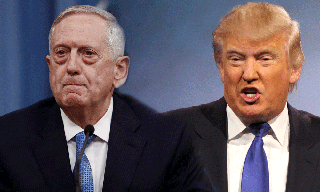According to the New York Times, US officials said that ahead of Friday’s US-led attack on Syria, Defense Secretary James Mattis urged the president to get Congressional approval first. Trump overruled this, however, and officials say he wanted a “rapid” response.
 Officials went on to say that Trump was worried about being seen not to follow through on his “get ready” Tweet about the attack. Mattis argued about the risk of a “wider war” with Russia. The compromise was the Friday attack, which was more limited than some hawks were expecting.
Officials went on to say that Trump was worried about being seen not to follow through on his “get ready” Tweet about the attack. Mattis argued about the risk of a “wider war” with Russia. The compromise was the Friday attack, which was more limited than some hawks were expecting.
This may explain the different tone of the two different Friday night announcements. President Trump was much more gung-ho about it being a “sustained” operation, while Mattis was very clear it was “a one-shot deal.”
It again shows a divide between Trump and Mattis on key foreign policy issues. It is particularly huge in this case because it reveals an active Defense Secretary wanting Congressional authorization for an overseas strike.
That’s huge, because recent administrations have been very dismissive of the idea they’d need Congressional authority. Congress, however, clearly has never authorized a strike against the Syrian government.
This may bolster Congressional interest in replacing the old Authorization for the Use of Military Force (AUMF) with one that’s more limited, and explicitly limited. Clearly, there is a need to establish the limits beforehand, as the Syria strike showed.
Of course, the current AUMF under debate doesn’t offer such limitations. Instead, it seeks to provide the illusion of limitations with an artificial four-year renewal clause. The lack of AUMF for attacking Syria, however, combined with attacking Syria, may force a serious rethink of this language. If Congress is to retain warmaking powers in any serious form, they must be able to make clear who the US is not at war with.


